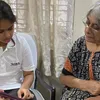It’s okay not to be okay, say teenage founders of online mental health platform
Aashna Parikh, Aritra Mallik, Hrishita Shah, and Nysa Agarwal, 14-year-old students of Dhirubhai Ambani International School, Mumbai, have launched Here To Help, an online platform that connects mental health experts to teenagers seeking help.
As we battle the uncertainty surrounding the coronavirus, social distancing, and other aspects, taking care of our mental health is of paramount importance.
A large population of young people, especially teenagers, is at the crossroads, worried about their education, future and how to cope with the changes in their present.

From left to right: Nysa Agarwal, Hrishita Shah, Aashna Parekh and Aritra Mallik
Aashna Parikh, Aritra Mallik, Hrishita Shah, and Nysa Agarwal, 14-year-old students of Dhirubhai Ambani International School, Mumbai, strongly believe that everyone focuses on physical health, but forgets about mental health, which is as important for complete wellbeing.
Online mental health resource
Mental health illnesses can affect anyone, regardless of age, gender, or race. This, and some of their own experiences, formed the premise for Here To Help, an online mental health platform for young people.
Hrishita shares her own experience with counselling and how it helped her cope with a sense of emptiness and anxiety.
“When I was 12 years old, I had my first therapy session because I did not understand what I was feeling and what was happening to me. It was highly impactful. I poured my heart out to my therapist and she listened without the slightest bit of judgement. After a few more sessions, we realised I had anxiety but it could be worked out through therapy without needing any medicines. The sessions benefited me immensely and I am now in a better place mentally,” she recalls.
She adds that taking a break from therapy for just a few months led to a deterioration in her physical health and grades. “This is when I actually understood the importance and benefits of seeking help. On my journey to better mental health, I realised some people can't afford this and some don’t go to therapy due to the stigma attached to it.”
Hearing about many similar experiences shocked the four friends and they realised the need for a solution. Unable to find a single platform in India specifically designed for teenagers and catering to mental health, they decided to create one.
By teenagers, for teenagers
Here to Help, their venture conceptualised and launched at Young Entrepreneurs Academy (YEA!), is an online platform for mental health, by teenagers and for teenagers. The aim is to provide affordable mental health therapy to every teenager who needs it, while breaking the stigma around such therapies in India.
The online platform helps connect a teenager to a qualified therapist through text, call, or video call.
While researching the market, the young founders realised there was tremendous scope for a platform like theirs.
The World Health Organisation has predicted that by the end of this year, 20 percent of India will be suffering from mental illnesses, which is approximately 270 million people. Amid the ongoing pandemic, the numbers will be even higher.
Here to Help offers packages like unlimited text therapy for a week priced at Rs 2,999 and unlimited text therapy for a week plus two audio calls for Rs 3,499 (additional video calls for Rs 899 for 45 minutes). It has monthly and annual packages, and has priced services keeping the target audience in mind.
“YEA! connected us to Dr Priti from the Marico Health Initiative. The meeting gave us immense clarity and we will always be grateful for the opportunity. From discussions about pricing to learning about the functioning of our helpline, the information helped us determine our path with a lot more assurance and clarity,” Aashna says.
As a team of four, the young girls step up to help the other if someone is too busy on a particular day. They have divided the work, with each person focusing on one aspect of their business: marketing, ideation, financials, and platform design.
“We are very particular about the selection of therapists on the platform as they have a significant impact on people’s wellbeing. All therapists need to have a master’s degree in psychology and a licence,” Aritra says.
Always Here to Help
In January this year, they showcased their idea at the YEA trade show.
The three young entrepreneurs came up with two games to exhibit the main ideas of their company.
Harshita says, “The first one was where a customer would draw or write about something that made them happy, no matter how big or small. This would help them practise gratitude, an important step towards mental wellness, showing them how they would feel when they use the platform. In the second game, the audience was asked to write down something that had recently upset them. Next, they would crumple up the paper and throw it at away. This highlighted a core value: no matter the problem of the customer, Here to Help will always be there to their pain.”
These two activities received a good response and Here To Help got several signups and enquiries at the trade show itself.
The young entrepreneurs are currently re-launching their online platform with added security and privacy features. They are also working on scaling business through social media platforms to reach a wider audience.
“We want to ensure that we are always Here to Help all those who don’t have someone to lean on, who need someone to talk to, and have mental health conditions,” Aashna says.
(Edited by Teja Lele Desai)








